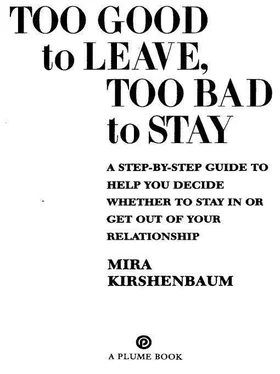Kirshenbaum, Mira - Too Good to Leave, Too Bad to Stay
Здесь есть возможность читать онлайн «Kirshenbaum, Mira - Too Good to Leave, Too Bad to Stay» весь текст электронной книги совершенно бесплатно (целиком полную версию без сокращений). В некоторых случаях можно слушать аудио, скачать через торрент в формате fb2 и присутствует краткое содержание. Жанр: Психология. Описание произведения, (предисловие) а так же отзывы посетителей доступны на портале библиотеки ЛибКат.
- Название:Too Good to Leave, Too Bad to Stay
- Автор:
- Жанр:
- Год:неизвестен
- ISBN:нет данных
- Рейтинг книги:3 / 5. Голосов: 1
-
Избранное:Добавить в избранное
- Отзывы:
-
Ваша оценка:
- 60
- 1
- 2
- 3
- 4
- 5
Too Good to Leave, Too Bad to Stay: краткое содержание, описание и аннотация
Предлагаем к чтению аннотацию, описание, краткое содержание или предисловие (зависит от того, что написал сам автор книги «Too Good to Leave, Too Bad to Stay»). Если вы не нашли необходимую информацию о книге — напишите в комментариях, мы постараемся отыскать её.
Too Good to Leave, Too Bad to Stay — читать онлайн бесплатно полную книгу (весь текст) целиком
Ниже представлен текст книги, разбитый по страницам. Система сохранения места последней прочитанной страницы, позволяет с удобством читать онлайн бесплатно книгу «Too Good to Leave, Too Bad to Stay», без необходимости каждый раз заново искать на чём Вы остановились. Поставьте закладку, и сможете в любой момент перейти на страницу, на которой закончили чтение.
Интервал:
Закладка:
Whatever love we feel for the other person feels so real, and yet we know we also have a responsibility to love ourselves. We see therapists on TV who claim they can bring any relationship back to vibrant life, but we know how difficult it is to change even the smallest thing in our own relationship.
No wonder so many of us have trouble figuring out what’s best for us to do. But you can find the clarity you’re looking for if you want to. And I believe you do want to, and that you have everything it takes to see what’s best for you.
TAKING RESPONSIBILITY TOGETHER
What makes a book like this possible is the fact that an individual can be unique and yet still be similar enough to other people to learn from them. Without our similarities, medicine and psychology would be impossible. It’s because we are similar that a diagnostic test or a wonder drug can help millions.
But it’s because we’re unique that medicine and psychology remain an art as well as a science. I know as a therapist that I can’t meet my responsibility to you if I forget for a moment that you are an individual. Just because you’re similar to other people in some respects doesn’t mean there aren’t profound differences as well. And I always have to take those differences into account.
But I also can’t meet my responsibility to you if I fail to probe for the experiences that link people. That’s the power that research and clinical practice give, not just mine but that of countless others, particularly Dr. Charles Foster, whose shoulders this book stands on.
Answers at Last
This book is based on an attempt to answer questions people have asked for a long time:
• Which iffy relationships will most likely be okay and which ones are virtually unfixable?
• What makes people happy they left a relationship? What makes them happy they recommitted to it?
Our research involved talking to people in the same situation you’re in. They were asked about their ambivalent feelings and their partners’ positives and negatives. They were followed over time, during which many tried to solve their problems (and many were successful) and many ended their relationships.
Then we tried to figure out what made some people say overwhelmingly this made me happy I left and made other people say overwhelmingly this made me happy I stayed. These answers evolved into the questions and guidelines that form the backbone of this book.
The ultimate test of all this is in one-on-one work with people like you. Only when these sturdy truths make sense for a wide spectrum of individuals can any of us feel confident that real help is available.
Trusting the Truth
To be fully responsible to your uniqueness, I have to be very careful about telling you what to do. But if I’ve found deep and powerful truths that hold up for large numbers of people, truths that have been validated over and over, don’t I also have a responsibility to tell you these truths? I can’t tell you what to do, but I can and must tell you what I know. I can’t predict the future, but I can tell you the odds.
It’s what trusted professionals in our lives do all the time. For example, about ten years ago I went to my dentist with a dull, intermittent toothache. He said I’d need a root canal to save the tooth and eliminate the source of the pain. He said that without a root canal the pain might go away for days or months or maybe even a year or two but it would come back and it would get worse. A root canal was the answer.
“How do you know for sure?” I asked.
“Well, I don’t know for sure,” he said. “Everyone’s unique, but this is how things will probably work out in your case because, based on what I can see, it’s how things generally work out for people in the kind of situation you’re in.”
I’m a show-me kind of person, so instead of following my dentist’s recommendation, I waited. I was betting that some quirky feature of my uniqueness would exempt me from the patterns my dentist knew so well.
Of course, he was right. I ended up in the worst pain of my life until I got the root canal I should’ve gotten earlier!
Our Contract
So here’s the deal between you and me. I won’t pull back from making definite recommendations about whether it’s best for you to stay or leave based on your realities and my research and twenty years of clinical experience. In turn, you won’t blindly follow my recommendations for people in a relationship like yours. You’ll certainly want to make sure that you listen to yourself first, to make sure that the reality you’ve uncovered does ring true for you.
And if you have a therapist or other trusted advisor, you’ll definitely want to run by them what you learn here. Nothing in this book overrules what a good therapist you’ve been working with might tell you.
At the same time, you know how easy it’s been for you to stay stuck in ambivalence, and this book is about finding clarity in your situation and giving yourself permission to act on that clarity. So our responsibility to each other requires me to tell you the truth as I know it, as definitively as I can. And it requires you to face your truth and then do something about it.
The truths I’ve discovered here are the kinds of things we all recognize when we hear them. They make sense to people. Your responsibility is to give them a chance to make sense to you. Don’t act on them before they make sense to you, but don’t fail to act on them afterward. Your life is too important to you to waste any part of it stuck in ambivalence.
2
Dancing in the Dark
Issue: Relationship Ambivalence
If you’re in a relationship that seems both too good to leave and too bad to stay in, every time something happens that clearly points to staying or leaving, you probably find yourself saying, “No, it can’t be that simple. There’s so much more for me to think about.” Then a dozen memories and feelings creep in and you say, “I’d better not make a decision until I see what’s best for everyone.” But you never do see what’s best for everyone.
This state you’re in is called relationship ambivalence.
The Road to Ambivalence
We all feel doubts about our partners from time to time, and we all occasionally speculate about what it would be like to be on our own or live with a different person. But that’s not relationship ambivalence.
I’m talking instead about what happens when the bulk of your attention shifts from being in your relationship to trying to figure out whether to stay in it or leave. This shift can take place at any time, from soon after you meet to the day after your twenty-fifth anniversary or even later.
Before that shift, there’s a taken-for-granted quality to your thinking about the relationship, even if from time to time you get upset about things.
Then one too many things go wrong. New problems appear. Bad qualities in the other person or in the relationship get worse while good qualities dwindle or get lost. You find yourself complaining about things like the following:
• “He’s made a million agreements about doing his share of the housework and never kept one of them.”
• “She had this affair with a guy from work, and I really think it’s been over between them for a year, but I’m having so much trouble letting go of the whole thing. And I don’t know what to do about it.”
• “This probably sounds like a Seinfeld episode but he’s a noisy breather—I mean every breath in and out is like a sighing or a moaning. He sounds like Darth Vader when he breathes. Is he the most annoying person who ever lived, or am I the most petty, oversensitive person who ever lived, or what?”
Читать дальшеИнтервал:
Закладка:
Похожие книги на «Too Good to Leave, Too Bad to Stay»
Представляем Вашему вниманию похожие книги на «Too Good to Leave, Too Bad to Stay» списком для выбора. Мы отобрали схожую по названию и смыслу литературу в надежде предоставить читателям больше вариантов отыскать новые, интересные, ещё непрочитанные произведения.
Обсуждение, отзывы о книге «Too Good to Leave, Too Bad to Stay» и просто собственные мнения читателей. Оставьте ваши комментарии, напишите, что Вы думаете о произведении, его смысле или главных героях. Укажите что конкретно понравилось, а что нет, и почему Вы так считаете.












